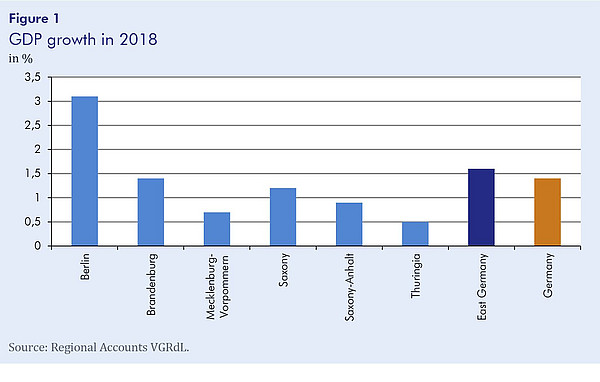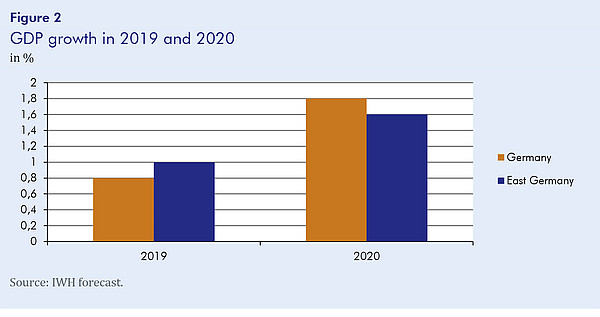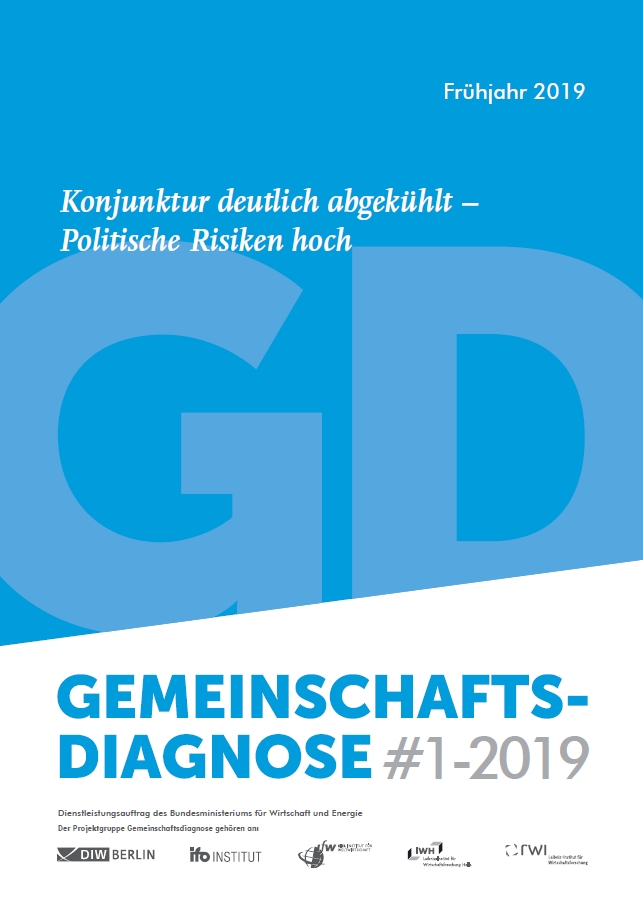Service providers in Berlin give boost to East German economy – implications of the Joint Economic Forecast and of official data on the East German economy in 2018
"Still, growth in East Germany was, with 1.6%, a bit higher, because the economy in Berlin expanded by 3.1%", says Oliver Holtemöller, Head of Department Macroeconomics and Vice President at the Halle Institute for Economic Research (IWH). During the whole upswing between 2014 and 2018, production in East Germany has expanded somewhat faster than the German economy due to the high growth dynamics of service providers in Berlin.

For 2019, the institutes forecast an increase in German GDP by no more than 0.8%, mainly because international sales prospects have deteriorated. The economy is supported by consumer-related services, which benefit from the significant increase in disposable income. This is particularly true of East Germany, as unemployment is falling faster in the West. In addition, growth momentum in Berlin is likely to continue. However, many East German companies find it increasingly difficult to expand production because in this region, skilled labour is, for demographic reasons, particularly scarce. Therefore, East German employment has recently slowed down by more than in the rest of the country.

All in all, IWH forecasts that the East German economy (including Berlin) will grow by 1.0% in 2019 (Germany: 0.8%), after 1.6% in 2018 (Germany: 1.4%). In the following year, East German production is expected to expand by 1.6% (Germany: 1.8%). According to the definition of the Federal Employment Agency, the unemployment rate should fall from 6.9% in 2018 to 6.4% in 2019 and 6.3% in 2020 (Germany in 2018: 5.2%, 2019: 4.8%, 2020: 4.6%).
Whom to contact
For Researchers

Vice President Department Head
If you have any further questions please contact me.
+49 345 7753-800 Request per E-MailFor Journalists

Internal and External Communications
If you have any further questions please contact me.
+49 345 7753-832 Request per E-MailIWH list of experts
The IWH list of experts provides an overview of IWH research topics and the researchers and scientists in these areas. The relevant experts for the topics listed there can be reached for questions as usual through the IWH Press Office.
Related Publications

Significant Cooling of the Economy – Political Risks High: Joint Economic Forecast Spring 2019
in: Dienstleistungsauftrag des Bundesministeriums für Wirtschaft und Energie, 1, 2019
Abstract
Die Konjunktur in Deutschland hat sich seit Mitte des Jahres 2018 merklich abgekühlt. Der langjährige Aufschwung ist damit offenbar zu einem Ende gekommen. Die schwächere Dynamik wurde sowohl vom internationalen Umfeld als auch von branchenspezifischen Ereignissen ausgelöst. Die weltwirtschaftlichen Rahmenbedingungen haben sich – auch aufgrund politischer Risiken – eingetrübt, und das Verarbeitende Gewerbe hat mit Produktionshemmnissen zu kämpfen. Die deutsche Wirtschaft durchläuft nunmehr eine Abkühlungsphase, in der die gesamtwirtschaftliche Überauslastung zurückgeht. Die Institute erwarten für das Jahr 2019 nur noch ein Wirtschaftswachstum von 0,8% und damit mehr als einen Prozentpunkt weniger als noch im Herbst 2018. Die Gefahr einer ausgeprägten Rezession mit negativen Veränderungsraten des Bruttoinlandsprodukts über mehrere Quartale halten die Institute jedoch bislang für gering, jedenfalls solange sich die politischen Risiken nicht weiter zuspitzen. Für das Jahr 2020 bestätigen die Institute ihre Prognose aus dem vergangenen Herbst: Das Bruttoinlandsprodukt dürfte im Jahr 2020 um 1,8% zunehmen.



